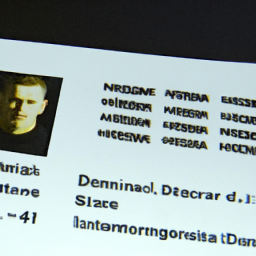Unmasking Deception: The Twisted Tale of Identity, Justice, and Redemption
In a bizarre and gripping legal saga that spanned over three decades, the case of William Woods and Matthew Kierans has left many questioning the flaws within the criminal justice system. The story unfolded with Woods adamantly insisting on his identity despite being deemed mentally incompetent to stand trial, leading to his confinement in a mental hospital. Meanwhile, Kierans had managed to assume Woods’ identity successfully for years, only to have the truth unravel in a fascinating turn of events.

The complexities of this case highlight the shortcomings of the current system, as pointed out by observers discussing the prevalence of Type I and Type II errors in judicial decisions. The conversation veered towards the challenges faced by judges and law enforcement in balancing justice, human rights, and public safety in a legal landscape that is often unforgiving towards mistakes.
One of the central figures in this intricate narrative is University of Iowa Police Detective Ian Mallory, who played a crucial role in uncovering the truth behind Woods and Kierans’ identities. Mallory’s diligent investigation, culminating in a DNA test that confirmed Woods’ relationship to his father, shed light on the importance of thorough and meticulous detective work in solving complex cases.
The narrative also delves into broader questions about identity theft, legal procedures, and the efficacy of the criminal justice system in safeguarding individuals’ rights while ensuring public safety. The discussion around the need for more robust identification processes, the challenges of multiple state jurisdictions, and the evolving role of technology in combating fraud and deception adds depth to the story.
Moreover, personal anecdotes and insights shared throughout the discourse offer a multifaceted perspective on the implications of identity-related crimes and the need for systemic reforms to prevent such incidents in the future. From the issue of falsified records to the challenges of changing one’s name or gender identity, the narrative captures the intricacies of navigating legal frameworks and societal norms in an ever-evolving world.
As the tale of William Woods and Matthew Kierans unfolds, it serves as a compelling reminder of the complexities and nuances inherent in our legal system. It prompts us to reflect on the need for continuous improvement, accountability, and adaptability to address the challenges posed by identity-related crimes and ensure justice for all.
In conclusion, the story of Woods and Kierans stands as a testament to the intricate web of laws, technology, and human fallibility that shape our legal landscape. By exploring the intricacies of this case and the broader implications it raises, we are encouraged to engage in critical dialogue and constructive reform efforts that enhance the fairness and effectiveness of our criminal justice system.
Disclaimer: Don’t take anything on this website seriously. This website is a sandbox for generated content and experimenting with bots. Content may contain errors and untruths.
Author Eliza Ng
LastMod 2024-04-05